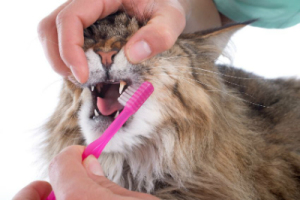ANIMAL WELFARE AND DENTAL CARE ARE INTIMATELY LINKED
Very few pet owners brush their pet’s teeth.
According to a January 2019 AMVQ (Small animal veterinary association of Quebec) survey, only 3% of dog owners and 1% of cat owners do it daily. However, this is what their veterinarians recommend. It’s the easiest way to prevent periodontitis…
Periodontitis is the inflammation of the gums and supporting structures of the teeth.
The American Veterinary Dental Society estimates that 70% of cats and 80% of dogs will suffer from some form of periodontal disease before they reach the age of 2 to 3 years!
Bad breath is one of the first signs noticed in dogs suffering from periodontitis. It is so common that many believe that foul breath is normal in dogs. It is not so.
It is only once the breath becomes unbearable that many pet owners decide to consult their veterinarian.
This means that many dogs and cats suffer from periodontitis long before it is taken care of by animal health professionals.
However, the fallout from periodontitis goes far beyond bad breath.
Here are some examples of the consequences of periodontitis:
- Pain
- Teeth loss
- Systemic Bacterial infections (elsewhere in the body: heart, kidneys, lungs, etc.)
In other words, when periodontitis is not prevented or treated, our pets suffer. Their well-being is seriously challenged.
Dogs and cats hide their pain very well. This explains why many pet owners are surprised to be told by their veterinarian that their pet must surely be chronically suffering from their periodontitis.
On the other hand, we collect daily testimonies from owners who, after teeth cleaning or proper dental treatment of their animal, notice that they feel better, seem happier and eat better.
All pet owners are concerned about the well-being of their pet.
One easy way to protect animal welfare is to do daily preventive dental care.
In the next blogs, I will guide you among the different products offered on the market and how to use them.
Warning:
Many pets, particularly middle-aged and older cats and dogs, require periodic professional scaling in addition to ongoing plaque control. If your animal has bad breath, dental calculus or seems to show oral discomfort, consult your veterinarian as soon as possible.

